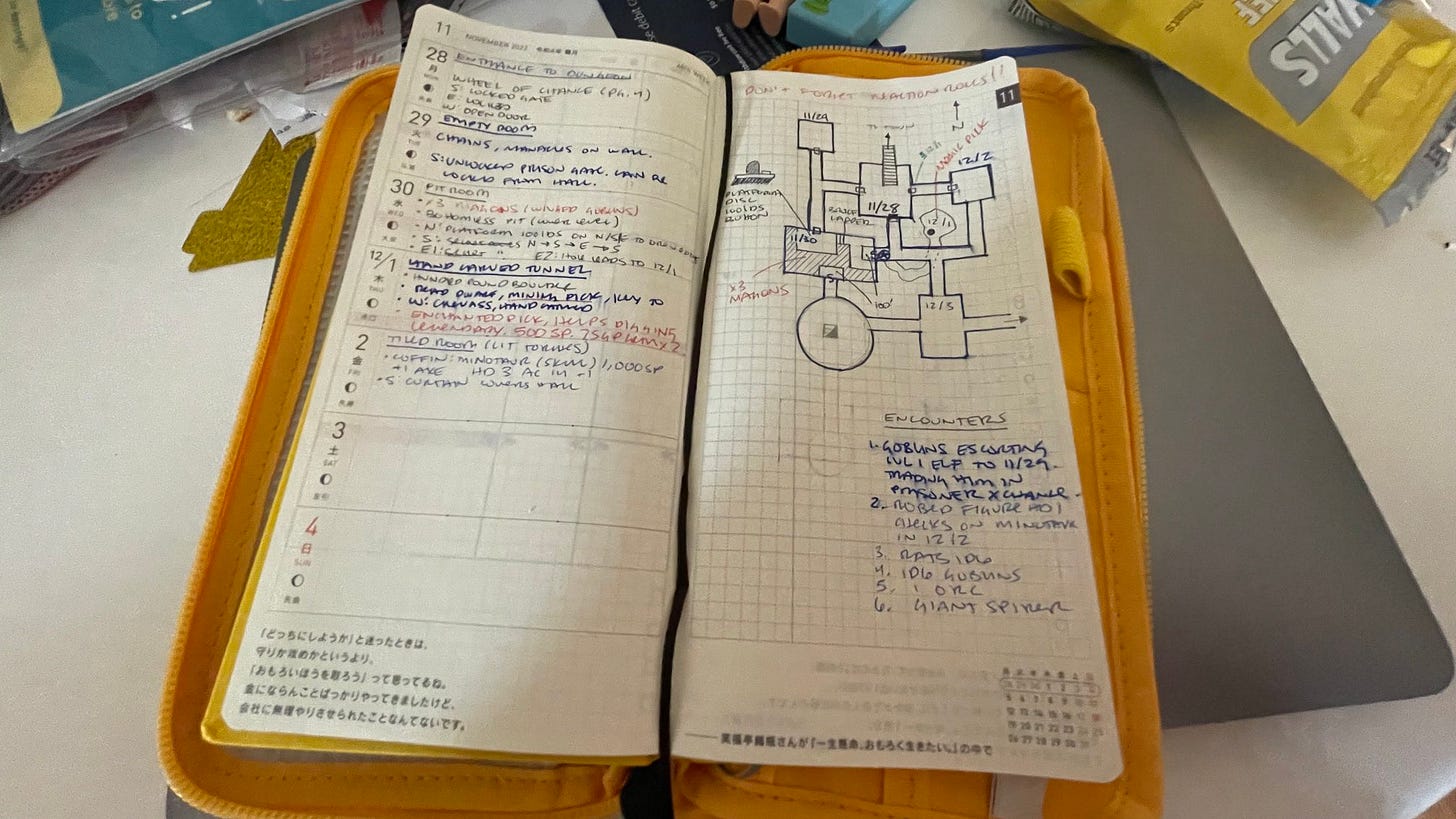Action or Intent?
And a new year challenge.
This Week’s post digs into the nuts and bolts of actually running an RPG. Not a new topic, but one I feel like I’m always learning new things about.
Action-Intent Duality
In Mythic Bastionland I refer to a six step process for adjudicating player action.
INTENT - What are you trying to do?
LEVERAGE - What makes it possible?
COST - Would it use a resource, grant a Burden, or have a negative side-effect?
STAKES - What's at risk? No risk, no roll.
ROLL - Make a Save or a Luck Roll.
IMPACT - Show the consequences, honour the Stakes, and move forward.
I used something similar in Ask the Stars.
And it's all there because I've found myself torn between two subtly different questions as my go-to catchphrase when running a game.
"What are you doing?"
vs
"What are you trying to do?"When really it's useful to understand both.
What are you doing?
The one you ask when the players are dawdling around in indecision. A prompt to spur them to make a decision and take action.
But also it begs more detail. The classic example is:
Player: I check the door for traps
GM: Ah, but what exactly are you doing?
I've talked before about how this very question is the secret sauce of RPGs, and I stand by that, but it's easy to see how some players might see an exchange like this and groan.
The trap example is perhaps a bit disingenuous for me to use, as I've made my stance on traps pretty clear, so this situation just wouldn't arise at my table. However, I use it here to show how in some games the need to describe exactly what you're doing can feel like a bit of a chore. Here the answer is obvious. The player describes how they very carefully look at the hinges, handle, under and over the door being very careful not to touch it. It's sort of a non-decision at that point, and the player is just hoping they haven't misspoken. This can have a fun tension in the right situation, but I wouldn't particularly seek it out.
So here I must be advocating for a different approach, right?
What are you trying to do?
You might have had conversations like this:
Player: I have that steel wire, right? So I want to tie it into a loop.
GM: Sure.
Player: Is the floor slippery at all?
GM: Not especially.
Player: How about the light in here, what's it like?
GM: Just your torchlight.
Player: And then is there somewhere I can hook this wire loop onto?
GM: Like on the wall? Ceiling?
Player: High on the wall, but not so high that I wouldn't be able to get leverage with...
GM: OKAY JUST TELL ME WHAT ARE YOU TRYING TO DO
Sometimes you just need to cut to the player telling you that they're trying to set up a tripwire.
Yeah, this is the opposite of the previous situation. Sometimes you need more clarity of action, sometimes more clarity of intent. In general it's best if the GM understands both.
So I'm calling this:
Action-Intent Duality
When the players declare an action, make sure you understand their intent.
When they declare an intent, make sure you understand their action.Now a principle is all well and good, but does my process at the top of this post actually adhere to this?
There's no step for "action", but that's because this whole process is only ever kicked off by a player declaring their action, so any clarification should be covered by the Leverage, Cost, and Stakes discussion. So it might go like this:
Player: I break down the door.
GM: Okay! So I'd say your intent is pretty obvious. Leverage is fine, this door isn't that tough. In terms of Cost I think it would make a lot of noise.
Player: Yeah, good point. How about I try to break off the hinges instead?So in most cases you don't need to get your players to describe their action in complete detail until those details start to affect the Leverage, Cost, and Stakes steps of the process.
As with so many of these processes, I'd hope that after using this one for a while some of the details start to come naturally and the scaffolding can be lifted away.
Art by Midjourney
Elsewhere
Sean McCoy is doing a thing about writing a megadungeon one room per day, one floor per month.
I’m debating whether to jump on the bandwagon. I’m not feeling especially dungeon-y right now, so I’m more tempted by a wilderness or perhaps even space project. Or maybe a whole bunch of boroughs of Bastion?
Coming Soon
Over on Patreon I wrote about my process for writing bit lists of 100 things.
There's a strong appeal to writing 100 of something, and I say this as somebody that doesn't really like the way it feels to roll d100.
Electric Bastionland required me to write 100 Failed Careers (plus a few extra). Now each career had around 12 "things" your character might get, plus a debtholder and some sample names, so it's really much more than 100 things.
A few tips:
Expect the full post on the blog next week.
Thanks for reading Bastionland Presser! Subscribe for free to receive new posts and support my work.





